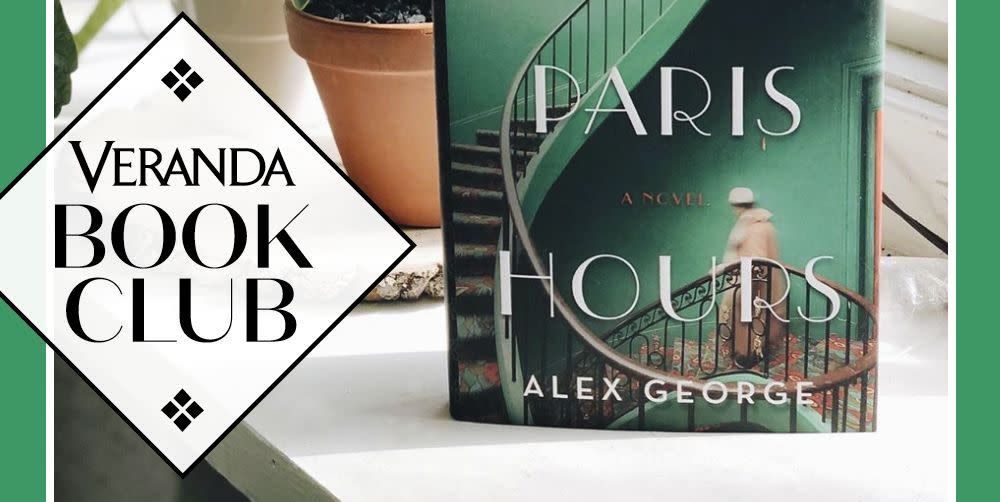Announcing the VERANDA Sip and Read Book Club!

We're thrilled to announce the VERANDA Sip and Read Book Club! Each month, we’ll dive in to a newly released book and offer exclusive conversations with the authors behind each tale over on Instagram, along with a perfectly matched cocktail. Our first pick is Alex George's spellbinding story of four people living in Paris in 1927 and the 24 hours that change their lives forever. (Pair it with our Summer 75, a fresh take on a French 75 that's perfect for poolside reading.) George is also the author of A Good American and the owner of independent bookstore Skylark Bookshop.
The slim novel came to me by way of suggestion. In this case, from my most knowledgeable of sources: Jake Reiss of the Alabama Booksmith. I needed something to read, and Jake, ever eager to supply my unwieldy literary habit, suggested I give Alex George’s latest, The Paris Hours, a try. (This is as much a lesson in finding friends in the right places as it is a review of a very, very good read.)
On the surface, The Paris Hours is the story of four unrelated figures living in Paris in 1927. Through alternating points of view, we get to know the cast of characters who weave us through the streets of the City of Lights: Souren Balakian, Guillaume Blanc, Jean-Paul Maillard, and Camille Clermont. It was Souren’s story that caught me first. An Armenian immigrant who fled his homeland to escape the Turkish invasion, his is the story that opens the book, as Souren works deep in the night by candlelight, stitching new clothes for a set of puppets. Souren works with “ferocious deliberation, as if it is his very life that he is stitching back together.”
But Souren isn’t the only one grasping at the threads of his life. Each of the others is, too. Camille, a woman who once worked for Marcel Proust, is now on a desperate quest to keep the dead writer’s secrets hidden — along with her own. Guillaume is a painter who’s made a bad bargain and is frantically searching for a way to save his neck.
Our final main character, Jean-Paul, is a journalist traipsing across the city in search of Americans to interview (a clever plot point, as it gives us reason to meet Josephine Baker and Ernest Hemingway, two of a handful of historical figures and places sprinkled throughout the text with deft purpose). Paris itself becomes a character, giving us a backdrop of everyday life amid the hustle and bustle of a city brimming with redemptive magic, to the point that none of our characters can shake the final speck of optimism that sends them on their respective quests.
It took me some time to ease into the jumps between each of these seemingly disparate journeys. As such, the beginning of the book took its time for me, but I wasn’t turned away. This was a story steeped in emotion, in yearning, in the desperate wish to change the past, and who among us can’t relate to such a thing?
When I read Guillaume’s passages, I shook my head at his fumbling while rooting for him to persevere, his desire to do right grating against his inability to get out of his own way. Camille is a woman with such drive that I had to know what fueled it — the answer would shift the entire narrative in an instant, so expertly hidden within the previous pages that I had to stop reading to marvel at the author’s craftsmanship. Indeed, with a third of the book left, I decided I had to set it aside or risk blowing through it into the wee hours of the night because I was desperate to know how these four people’s journeys were going to be resolved. The final few chapters hummed with just the right amount of tension to keep me turning the page, racing forward, Jean-Paul’s story binding the final threads of plot together in a heart-wrenching conclusion.
By shifting through both time and character with each chapter, George requires us to pay attention to the details — an effort in the beginning, as I committed each character’s stories to memory. And yet, I found myself relishing the small challenge of this and the delight it gave me each time a carefully woven link between each character surfaced, as if I’d uncovered a hidden gem within the text.
In this way, George is having a conversation with us — look here, the text whispers. Remember this for later. Our efforts are rewarded with George’s expert stitching of these four journeys into a seamless ending, taut with emotion, not a word spared.
When I finally let myself, I raced through the final third, breathless to find out how it would conclude. Even the ending spares no expense, stopping at just the moment we’ve been building toward as the clock strikes and our final hour in Paris comes to a bittersweet close.
Have you read The Paris Hours? Be sure to follow VERANDA on Instagram for our Q&A with author Alex George later in May, as well as to be the first to know about our next Sip and Read Book Club pick. Grab the Summer 75 recipe here!
You Might Also Like

